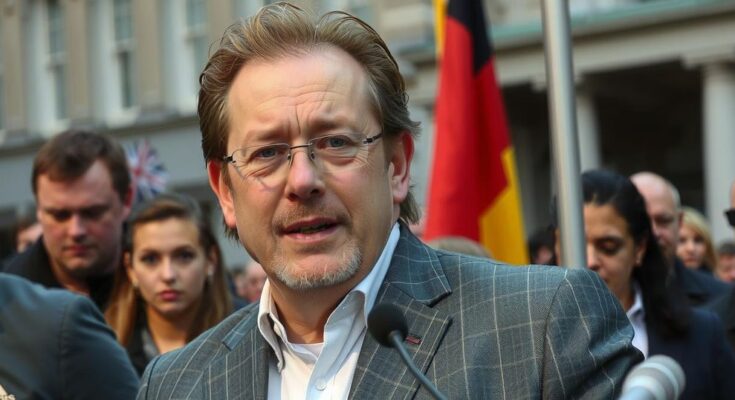Elon Musk faces accusations from the German government of attempting to influence the upcoming elections through his endorsement of the far-right AfD party. His op-ed raised significant backlash, leading to a newspaper editor’s resignation and condemnation from various political leaders, who equate his actions to external threats against democracy.
In a notable controversy, the German government has publicly accused billionaire entrepreneur Elon Musk of attempting to unduly sway the upcoming parliamentary elections scheduled for February. This allegation arises from Musk’s recent op-ed in the Welt am Sonntag newspaper, where he openly expressed support for the far-right Alternative for Germany (AfD) party. The piece incited backlash, leading to the resignation of the newspaper’s commentary editor in protest against Musk’s views. Government representatives characterized Musk’s actions as indicative of an influence campaign, while simultaneously allowing for the freedom of expression rights, albeit dismissing his assertions as “nonsense.” Musk has justified his interventions by referencing his significant investments in Germany and has praised the AfD’s positions on regulatory reforms and taxation policies.
As Germany gears up for the February 23 elections following the breakdown of Chancellor Olaf Scholz’s coalition government, the AfD appears positioned to capitalize on potential voter discontent. Current polls indicate that the AfD is gaining traction as it secures a second-place position, simultaneously stirring fears amongst mainstream parties of a right-wing extremist presence possibly affecting governance post-election. Scholz’s government has consistently reiterated its unwillingness to engage with the AfD, which has faced scrutiny and is under surveillance for extremist tendencies by domestic intelligence agencies.
The political landscape has seen sharp criticism directed at Musk from various leaders, including Lars Klingbeil, co-leader of the Social Democrats, who drew parallels between Musk’s actions and those of Russian President Vladimir Putin, suggesting both seek to manipulate democratic processes to weaken Germany. In a similar vein, opposition leader Friedrich Merz condemned Musk’s comments as intrusive. Thus, the intersection of international business influence and domestic political affairs has sparked a significant discourse within Germany, raising questions about the implications of external figures intervening in national elections.
In the context of rising populism and extremist parties in Europe, the German political framework is scrutinized heavily to balance democratic integrity against external influences. Musk’s endorsement of the AfD comes amid a tumultuous political period marked by the collapse of the governing coalition led by Olaf Scholz. The AfD, having maintained a foothold in German politics, presents a challenging scenario for established parties that deem it as a threat to democratic norms, particularly given its controversial positions.
In summary, Elon Musk’s foray into German politics has ignited fierce debates about foreign influence on electoral processes. His endorsement of the AfD, while rooted in his assertions of economic engagement, has provoked a strong backlash from German officials who view such actions as potentially destabilizing to democratic governance. As the elections approach, the interplay between business interests and political integrity remains a critical focal point in German discourse.
Original Source: www.ynetnews.com




